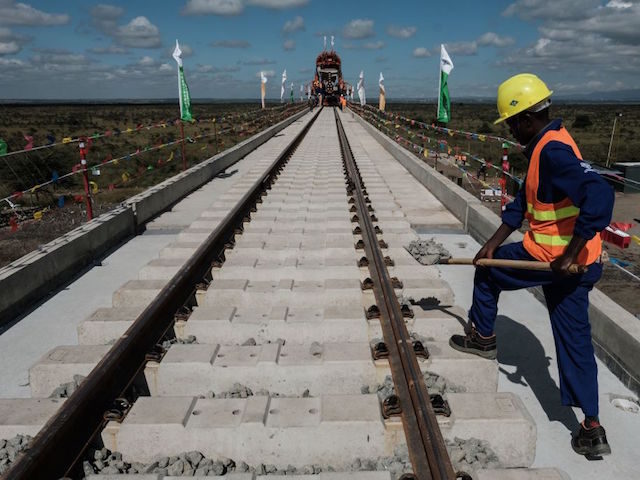Two Kenyan activists filed suit in Mombasa on Tuesday seeking the public disclosure of all contracts, agreements, and studies related to the Standard Gauge Railway (SGR) project — the massive Chinese-funded railroad project critics have denounced as a boondoggle and “debt trap.”
Critics contend it has not delivered the jobs or income promised and Kenya could sacrifice its sovereignty if it falls behind on paying the gigantic loans it took from Chinese banks.
“SGR is the largest capital-intensive infrastructure project ever constructed in Kenya. But despite this extraordinary expenditure of public funds, the SGR project has been undertaken with controversy and secrecy from its inception,” said Wanjiru Gikonyo of Kenya’s Institute for Social Accountability and Khelef Khalifa of Muslims for Human Rights in their lawsuit. Several other Kenyan activists groups were named as “interested parties” in the court filing.
The Daily Nation, Kenya’s largest daily newspaper, outlined their concerns:
They lament in court documents that fundamental information about the project’s financing, tendering and construction has not been released to the public. Their concerns are based on fears that the Mombasa port might have been used as a collateral for the Chinese loans that built the rail line, thus exposing it to a takeover by a foreign government in the event Kenya defaults.
The lawsuit charges Kenyan officials violated the Public Procurement Act and other transparency laws, from the project’s inception in 2017 to the present, as the railroad is operated by a private Chinese firm called Africa Star Railways Company Ltd. that claims enormous monthly operating costs but offers little public disclosure.
The Kenyan government admits the SGR has been operating at a loss for the past four years. Gikonyo and Khalifa’s suit argues the railroad’s finances are even worse than the government admits. They warned the Kenyan public has never been clearly told what will happen if the Chinese loans go into default.
Many Kenyans fear the Port of Mombasa was used as collateral for the SGR and Beijing will take control of the facility if Kenya defaults, much as China took control of a port in Sri Lanka in 2015. Kenyan officials insisted as recently as March 2021 that China cannot seize the port, no matter what becomes of the $3.2 billion SGR loan. The suit from Gikonyo and Khalifa notes they never offer any documentation to back up these reassurances.
“We have written to the government over this but they have not complied with this request and have failed to cite a valid exception to producing the documents or provide a valid reason for their impugned decisions for not providing the documents,” the lawsuit charged.
Other activists have worked for years to pry documentation from the grip of the Kenyan government, contending that the public would demand termination of the deal with China if it understood just how bad the terms were for Kenya.
“What happened with the SGR, the loan from Exim Bank of China was paid to a contractor, so it never came to Kenya. What came to Kenya was a debt. There was the question of the proposer of the project being the implementer and also overseeing, which also is a conflict of interest that arose,” human rights activist Okiya Omtata explained in February 2020.
“The other question was, was it standard gauge or Chinese gauge railway? If you look at the contract, it’s a Chinese standard. So we cannot go to Brazil and buy spares for this. We must buy things from China. We are being tied to China forever,” Omtata added.
Omtata won a judgment from the Kenyan Court of Appeals in June 2020 that the SGR contract was awarded to the China Road and Bridge Corporation (CRBC) in 2011. The court frowned on the way Chinese banks made the SGR loans conditional on a Chinese construction company receiving the lucrative contract.
The Court of Appeals refrained from declaring the SGR unconstitutional, leaving the precise effect of its decision ambiguous. Some observers speculated the Kenyan government secretly applauded Omtata’s suit because it could use the Court of Appeals judgment as legal artillery in a future international court case, after defaulting on its Chinese loans.
In a bitter twist, the court rewarded Kenya’s government for its opacity by striking some of the evidence Omtata and the Law Society of Kenya presented because they obtained the documents illegally after the government refused to provide them.

COMMENTS
Please let us know if you're having issues with commenting.